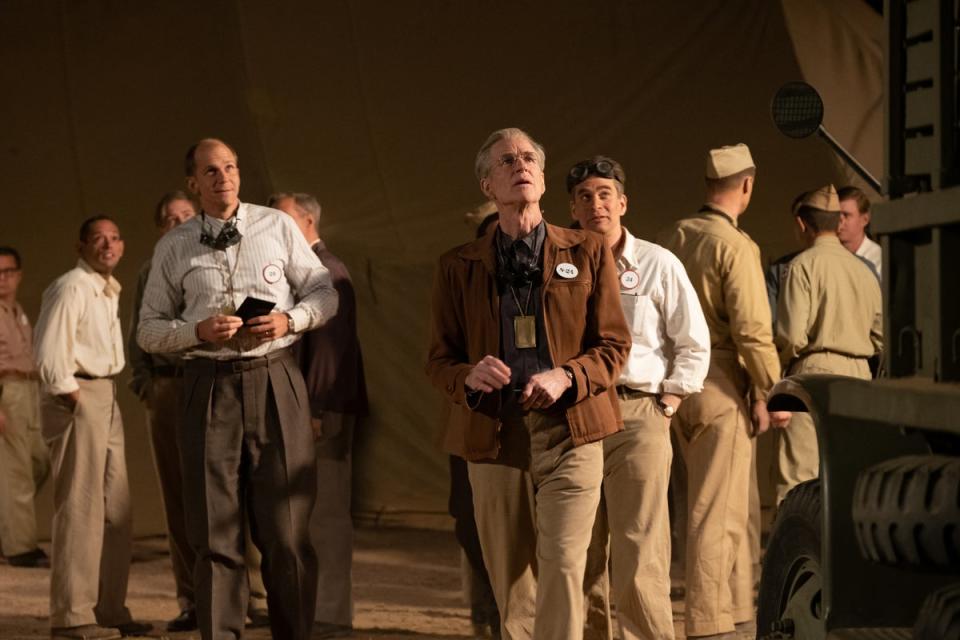Oppenheimer review: Christopher Nolan’s dark, immersive epic gives Cillian Murphy the role of his career
Christopher Nolan’s latest is both a trippy action movie and an immersive biopic. Running a full three hours, it is a provocative and sometimes sexually graphic portrait of the troubled physicist who oversaw the creation of the atomic bomb.
Nolan is known for his dark visions, but this is the most profoundly pessimistic work yet. That said, Oppenheimer – which is as intimate and tender as Nolan’s early masterpiece Memento – is frequently very funny. If we’re still alive in 2024 (and the movie suggests imminent destruction is closer than we think) it should clean up at the Oscars.
The script is based on the Pulitzer Prize-winning book American Prometheus, and gives 47-year-old Cillian Murphy, who’s never played the lead in a blockbuster, the role of his career.
We follow the New York-born Oppenheimer from Cambridge student to old man, (though not chronologically; the editing is fast, furious and, ultimately, mind-blowing). As played by Murphy, “Oppie” widens his pretty blue eyes, flashes an electric smile and has a gentle, measured, hypnotically soothing voice. A charming and ambitious polymath, he’s put in charge of the Los Alamos-based Manhattan Project, and races to save the world from the Nazis.
Yet, Oppenheimer can also be hypocritical, arrogant, cowardly, narcissistic and, when he fancies it, disloyal. For a genius, he’s capable of being a real dummy, too. He thinks he has the measure of the conservative politicians and army guys trying to ensure the Soviets don’t derail this mission impossible. He’s wrong.

The building, and testing, of the bomb dominates the middle section of the movie, which contains a shocking act, sweaty suspense and top banter (Matt Damon, as a wryly no-nonsense army officer is on fine form; ditto Emily Blunt, as Oppenheimer’s frustrated wife, Kitty). We get colossal bang for our buck, and the horrific consequences for the people of Hiroshima and Nagasaki are heard and seen (though not in the way you might expect).
In the third act, Nolan finds a unique way to tackle Oppenheimer’s remorse (both with regard to the A-bombs and his lover Jean Tatlock, played by Florence Pugh). Instead of watching him wring his hands, we’re forced to pay attention to the outcome of two unofficial trials.
One takes place in 1954, during the “second Red Scare”, and sees Oppenheimer’s reputation on the line. The other, held in 1959, revolves around a one-time acquaintance of Oppenheimer’s, U.S. Atomic Energy Commission chairman, Lewis Strauss (a sublime Robert Downey Jr). What interests Nolan: how easy it is to lose sight of the bigger picture, a crime that both of these men are guilty of.
The simultaneously old-school and new-school gorgeousness of Oppenheimer can’t be overstressed (Nolan despises digital trickery; he uses film-stock, of the IMAX-friendly kind).
This filmmaker is back on track. Though impeccably shot and acted, the much-lauded Dunkirk was overblown, while Tenet tried too hard to be clever. Oppenheimer (which again features Kenneth Branagh) avoids those pitfalls, the antithesis of a self-regarding, bigger-equals-better prestige project.
In the Barbie vs Oppenheimer struggle, neither is the Goliath. Give peace a chance and see them both.
Oppenheimer is in cinemas from Friday
180mins, cert 15

 Yahoo Movies
Yahoo Movies 
